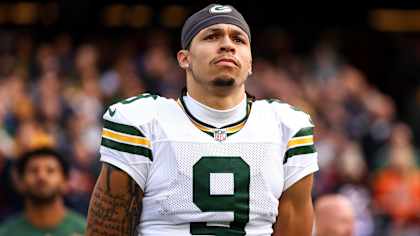"HE SHOULD GET OUT OF THIS BEAUTIFUL COUNTRY" - Green Bay Packers superstar Christian Watson speaks out on Jimmy Kimmel announcing the end of Jimmy Kimmel Live and saying goodbye to America - "I'm moving to Canada and NEVER coming back!" Christian Watson just shook his head and gave Jimmy Kimmel 8 shocking words of advice...momo.
The entertainment world was rattled when late-night host Jimmy Kimmel shocked audiences by announcing the end of Jimmy Kimmel Live and declaring that he would be leaving America altogether. His statement drew immediate attention nationwide.
:max_bytes(150000):strip_icc():focal(726x263:728x265)/jimmy-kimmel-live-091825-9b804cc93a0d4c3081735c6d8cf5df2c.jpg)
Kimmel’s announcement, coupled with his vow to move permanently to Canada, sparked a wide range of reactions. Many celebrities weighed in with mixed feelings, while fans debated whether his departure marked the end of an era in television comedy.
Among the voices emerging from the sports world, Green Bay Packers wide receiver Christian Watson stood out. Known for his blunt honesty, Watson did not hold back when asked about the comedian’s highly publicized decision.
“HE SHOULD GET OUT OF THIS BEAUTIFUL COUNTRY,” Watson stated firmly when approached by reporters. He went further, adding with a shake of his head: “I’m moving to Canada and NEVER coming back!” — mimicking Kimmel’s own words.

The response stunned many, as Watson is typically measured in public comments. This time, however, the star athlete seemed determined to send a strong message, aligning himself with patriotic values and a defense of American pride.
Watson’s comments quickly went viral across social media platforms, igniting debates about celebrity privilege and the responsibilities of public figures. Some applauded his candor, while others criticized his approach as overly harsh.
Still, Watson maintained that his remarks were not personal but rooted in principle. He argued that America remains a land of opportunity and that those who publicly dismiss it should reconsider their platform and influence.
As the dust settles, the clash between Kimmel’s dramatic farewell and Watson’s fiery reaction underscores the growing intersection of sports, politics, and entertainment — a space where star athletes increasingly shape public discourse well beyond the playing field.
Jason Kelce Defends Bad Bunny Amid Super Bowl Backlash: “If He’s a Bad Fit for the Super Bowl, Then Maybe His Critics Are a Bad Fit for America’s Future” chuong

In a fiery statement that has taken social media by storm, Philadelphia Eagles legend Jason Kelce waded into one of the biggest cultural debates of the year — the controversy surrounding

Speaking during an interview on a Philadelphia radio show, Kelce didn’t mince words. “If Bad Bunny is a bad fit for the Super Bowl,” he said, “then maybe the people making these comments are a bad fit for America’s future.” His words immediately went viral, sparking a nationwide firestorm of reactions across political, sports, and entertainment circles.
Kelce, widely respected both for his Hall of Fame-worthy career and his no-nonsense personality, emphasized that football — like music — is about unity. “The Super Bowl isn’t just a game,” he said. “It’s one of the few times this country comes together. If you can’t handle a Puerto Rican artist representing the global reach of American culture, then maybe you’re missing the point of what this country stands for.”
The timing of Kelce’s comments couldn’t have been more charged. The NFL has faced intense criticism from conservative groups and commentators who argue that Bad Bunny’s inclusion represents the “woke-ification” of sports
Within hours of Kelce’s remarks, hashtags like #KelceForUnity and #BadBunnySuperBowl trended across X (formerly Twitter). Fans flooded the platform with messages praising his courage to speak up in an increasingly polarized environment. One user wrote, “Jason Kelce just reminded everyone what real leadership sounds like — defending freedom, not fear.” Another commented, “He’s right. The Super Bowl is for everyone, not just one type of American.”
However, not everyone was impressed. Some conservative commentators accused Kelce of “virtue signaling” and “pandering to the media.” Radio host Dan Ball of OAN blasted the statement, saying, “Jason Kelce should stick to football. Defending Bad Bunny doesn’t make him a hero — it makes him part of the problem.”

Despite the backlash, Kelce has not backed down. Sources close to the player say he stands by his remarks and believes it’s time athletes use their platforms to promote unity over division. “You don’t have to agree with every artist or every message,” Kelce reportedly told friends, “but if we start deciding who’s ‘American enough’ to perform, then we’ve lost what makes this country special.”
Bad Bunny himself has yet to publicly respond to Kelce’s defense, but insiders claim the artist was “deeply moved” by the show of support. With the Super Bowl halftime show now under unprecedented scrutiny, Kelce’s words have become more than just a soundbite — they’ve reignited a national conversation about who gets to represent America’s biggest stage.
In the end, Jason Kelce may have done what no politician or PR campaign could: reminded millions that patriotism isn’t about exclusion, but about embracing difference — even when it makes people uncomfortable.





